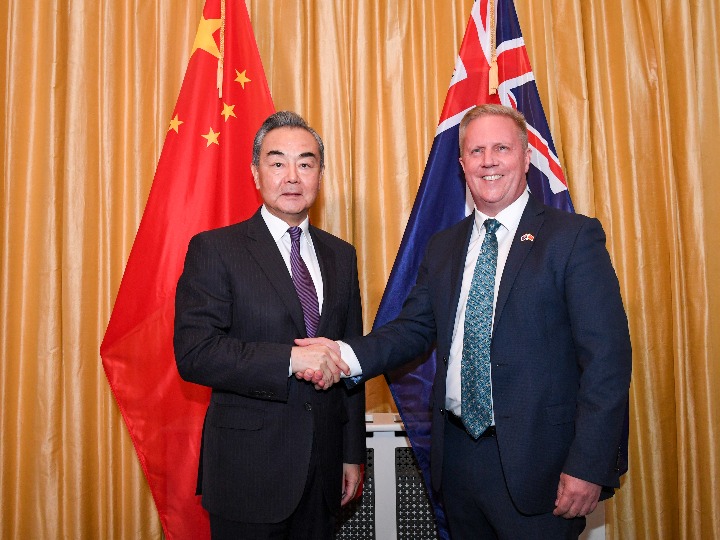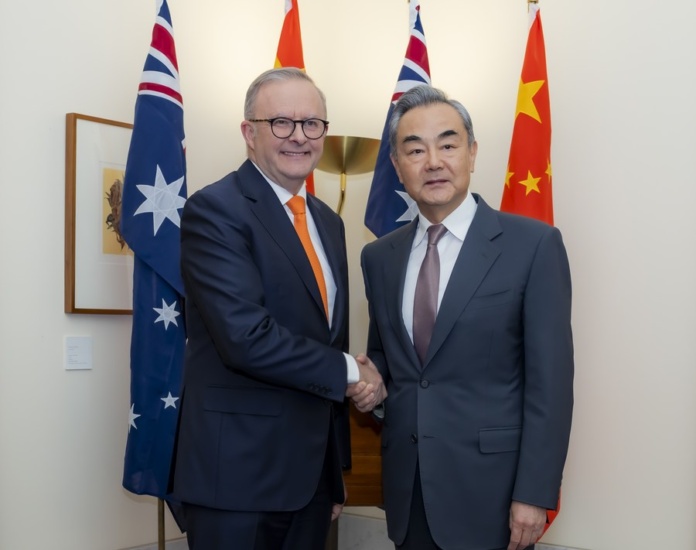The recent visit of the Chinese Foreign Minister, Wang Yi, to New Zealand and Australia, has important implications for China’s relations with not only the two countries but also the international relations of the Asia-Pacific region.

On March 18, Wang Yi met New Zealand’s Minister for Trade Todd McClay in Wellington. Wang said that both countries adhered to the principles of mutual respect and inclusiveness, focusing on cooperation and benefiting the people. Moreover, China, according to Wang, is keen to work with New Zealand on their upgraded Free Trade Agreement and to negotiate over the list of trade services. Wang added that both sides should safeguard free trade, oppose unilateralism and protectionism in the name of “de-risking,” and continue to open the world economy.
In response, Todd McClay said that both countries had fruitful results in bilateral cooperation and that New Zealand is keen to work with China cooperatively in the areas of trade, personnel exchanges. Furthermore, New Zealand is upholding the principles of free trade and to resist protectionism and unilateralism.
On March 20, Wang Yi held the seventh China-Australia Foreign and Strategic Dialogue with Australian Foreign Minister Penny Wong in Canberra. Wang remarked that when President Xi Jinping met Prime Minister Anthony Albanese in November 2022, both sides reached consensus on the need to accelerate the improvement of bilateral relations. Wang added that both countries had ups and downs in their bilateral relations, but China never intervenes in Australia’s domestic affairs. On China’s sovereignty, dignity and security concerns, according to Wang, Beijing hopes that Canberra would respect them.
Wang also said that both sides should pursue a win-win situation, seeking common ground and shelving their differences. Almost 80 percent of Australia’s trade surplus comes from China, Wang added, and as such, the protection and advancement of common interests should be the priorities of both sides. Finally, Wang commented that China pursues an independent foreign policy without targeting at any third country.
Wang Yi also met the business and strategic elites in Canberra, thanking them for promoting friendship and trade. He elaborated that China attached great importance to maintaining peace, promoting talks that lead to peace, and contributing to peace and stability in the world. China also strives for “democracy” in international relations, opposes “unilateralism” and “bullying acts,” opens its door to the outside world, and fosters an environment governed by the market, law and the international standards. Australians are welcome to visit China, according to Wang. He appealed to both sides to cooperate more closely in the areas of trade, finance, education, health. climate change, and scientific research.
Wang Yi’s visit to New Zealand and Australia had political significance.
First and foremost, his visit took place at a time when the perception of “the China threat” remains deep-rooted among the psyche of some strategic elites in New Zealand and Australia, Wang Yi’s remarks and reiteration on China as a peaceful country attaching importance to bilateral cooperation, world stability and the international standards and law aimed at pacifying such fears of the “Chinese threat.” The cooperation between the police in China and that in the Solomon Islands has recently raised the eyebrows of Australia and New Zealand. Furthermore, China’s disputes with the Philippines over the sovereignty of Scarborough Shoal have already alarmed some countries. Objectively speaking, the western perception of the “China threat” is not going to fade away easily unless China exercises even more caution in its marine police and naval activities. Under the context of the prevalence of “the China threat” perception among some strategic elites in New Zealand and Australia, Wang Yi’s visit was politically significant, trying his best to calm down their fears.
Second, Wang Yi’s’ visit occurred at a time before the upcoming US presidential elections. With concerns about the possibility of Donald Trump’s return to presidential power, some strategic elites in different countries are perhaps preparing for a scenario in which the US will likely return to a more isolationist, more protectionist and highly erratic and unpredictable stance. Although continuities rather than changes would perhaps characterize US foreign policy toward the Asia-Pacific region even though Donald Trump would perhaps return to presidential power, Wang Yi’s visit coincided with the hidden concerns about the uncertain and fluctuating US foreign policy in the psyche of perhaps some strategic and diplomatic elites in New Zealand and Australia. In short, Wang Yi’s visits to New Zealand and Australia were timely and strategic, perhaps striking a chord with some concerns about possible shift in US foreign policy. When Wang mentioned China’s opposition to protectionism, it could perhaps be a position increasingly shared by those concerned about Trumpism in US foreign-policy implementation.

Third, just prior to Wang Yi’s visit, Australia made a gesture of goodwill by suspending trade remedy measures against Chinese wind towers when these measures would expire on April 16, 2024. The Australian gesture was a smart one, from a diplomatic perspective, because Penny Wong tactically raised the issue of human rights record during her meeting with Wang Yi, including the suspended death sentence on Australian writer Yang Hengjun, and the circumstances in Xinjiang, Tibet and Hong Kong. Indeed, Wang Yi had already appealed to foreign countries, including Australia, not to interfere with China’s domestic affairs, which cover Xinjiang, Tibet and Hong Kong. Still, Wong spoke to Wang frankly about “Australians detained in China,” a priority issue that reflected Australia’s desire that China would deal with the Yang case perhaps leniently and diplomatically. Penny Wong said in a press conference that Australia raised “our serious concern about unsafe conduct at sea, our desire for peace and stability in the Taiwan Strait, and in our region (The Guardian, March 19, 2024).” If assertive Chinese nationalism has characterized China’s foreign policy since the leadership of Foreign Minister Wang Yi, such assertive nationalism could perhaps be also seen in the Australian side, especially Penny Wong’s content of discussion with Wang.
Fourth, if differences in political and ideological values mark the Sino-Australian relations, the same phenomenon can be seen in the Sino-New Zealand relations. During the meeting with Wang Yi on March 18, New Zealand Foreign Minister Winston Peters raised his concerns about “human rights, the situation in Xinjiang, Tibet and Hong Kong, and the increased tensions in the South China Sea and the Taiwan Strait (Reuters, March 18, 2024).” Both New Zealand and Australia coincidentally or deliberately raised similar issues. As a traditionally low-profile member of the Five Eyes alliance, New Zealand usually voices its concerns to China in a silent manner – perhaps it could also be seen in Wang Yi’s visit to New Zealand.
Fifth, as New Zealand and Australia have raised their concerns about the Taiwan Strait, it can be said that they are now observing how mainland China will cope with the new government of Taiwan under the leadership of William Lai after May 20, 2024. Such concerns have also been expressed by strategic and diplomatic elites of different countries, including the United States and the United Kingdom. As such, Wang Yi’s emphasis on China as a peaceful country during his visit to New Zealand and Australia while appealing to foreign countries to respect China’s sovereignty and domestic affairs was a kind of preemptive remarks against such foreign concerns. Still, as long as Beijing-Taipei relations remain volatile and unstable, the question of Taiwan’s political future will become a constant concern among the US allies in the Asia-Pacific region, including New Zealand and Australia.
In conclusion, Wang Yi’s visits to New Zealand and Australia were politically and diplomatically significant. The visits came at a time when the “China threat” perception remains deep-rooted among the US allies, when some strategic elites in the two countries cast doubts on whether the US foreign policy would change again with the prospects of Donald Trump’s possible return to presidential power, when Australia made a goodwill gesture in the hope of a possible reciprocal move from China over the case of Yang Hengjun, when the clashes of ideological values remain prominent between China on the one hand and New Zealand and Australia on the other hand, and when the question of Taiwan’s political future remains a concern in the psyche of the New Zealand and Australian leadership. Obviously, Wang Yi’s visits could achieve the objective of enhancing dialogue, communications and cooperation with the two countries, but such success appears to encounter tremendous obstacles for further breakthrough mainly due to profound ideological and political differences.
*Sonny Shiu-Hing Lo is a political scientist, veteran commentator, and author of dozens of books and academic articles on Hong Kong, Macau, and Greater China




















